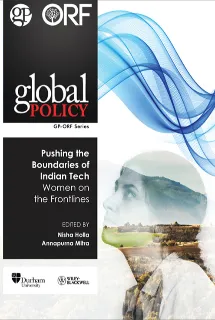Technology is an integral part of India’s socio-economic growth story. The country houses the third largest startup ecosystem in the world, after the US and China. Over 50,000 startups have created north of US$500 billion in value over the last decade[1]. Technology has powered this trajectory, particularly with the development of the multilayered technology network IndiaStack, which has led to unprecedented financial and digital inclusion. India is witnessing two pivotal women-centric phenomena at this time — one, there is an unparalleled inclusion of women in the Indian economy, boosted by technology platforms; and two, women are increasingly pushing the boundaries of technology development. This Global Policy-ORF report on ‘Women on the Frontlines’ showcases the latter.
When India’s Mangalyaan mission was launched a few years ago, the iconic image that captured millions of hearts was that of the scientists behind the achievement — a group of women, in saris with flowers in their hair, celebrating the launch. This is emblematic of many women in science and technology today, particularly in India — they are pushing the boundaries in their respective fields, but often from behind the scenes. It is worthy to note that Indian women enter STEM fields in far greater numbers than in peer countries. Women now make up 34 percent of the IT workforce in India. We are also at 50:50 gender parity rate in STEM graduates[2]. This is far higher than in Europe (18 percent) and the US (about 25 percent)[3]. India’s higher education system also reflects this directional movement; last year for the first time, women’s gross enrolment ratio (26.4) exceeded that of men (26.3)[4]. Indian women are rising with clear aspirations.
This report aims to showcase women on the frontlines of technology development and deployment and to highlight both their professional achievements and their individual stories. We first meet four trailblazers, who started working in technology when it was a relatively new field in India and, in a time that was far less welcoming to women. We then showcase the leaders of tomorrow, women who started their journeys more recently but are already seeing success across a range of ventures.
The contribution of the trailblazers has been invaluable in building India’s tech ecosystem. Kiran Mazumdar-Shaw, founder, chairperson and managing director of Biocon Ltd. and one of India’s few self-made women billionaires, has fearlessly steered her company into a global pioneer in the biopharmaceutical space. Nivruti Rai, country head of Intel India, has risen through the ranks of one of the world’s foremost technology companies and brings her multi-dimensional product experience to pushing the boundaries of Indian research and development. Dr Renu Swarup, Secretary of the Department of Biotechnology (Ministry of Science and Technology, Government of India), straddles the critical juncture of science and governance and has been crucial in setting up a pipeline of early-stage highrisk scientific development ventures in the country. Vani Kola, founder and managing director of Kalaari Capital, has pioneered the role and deployment of early-stage risk capital in the development of indigenous technologies. These trailblazers are role models to the millions who have been inspired to follow them into various technology fields.
Our ‘Leaders of Tomorrow’ section features women who have founded and built companies at the cutting-edge of technology across a range of segments — finance, data analytics, media, scientific innovation and education. They have brought technical and management expertise to bear on a range of problems, using either digital platforms or deep technology for their growth and value proposition.
In the field of financial technology, India has emerged a leader of innovation. The entrepreneurs who have contributed to the ‘Financial Technology’ section have all developed proprietary fintech platforms to solve specific market gaps. Mabel Chacko and Deena Jacob from Open, the world’s largest SME-focused neo-banking platform, help over 500,000 small enterprises resolve challenges in accessing and managing finances. Jayalakshmi Manohar, of Streak, brings state of the art technology to the average retail investor, earlier available only to large institutional investors. Chaitra Chidanand, formerly of Simpl, created a platform to provide temporary credit to users conducting purchases with cutting-edge machine learning technology to manage credit risks. A common theme with our four features is the use of technology to assist previously underserved groups.
Our ‘Data Platforms at the Edge’ section features three women who are harnessing the infinite potential of data platforms. Infibeam, co-founded by Neeru Sharma, uses data platforms across a range of services including online retailing, digital payments, e-commerce, software and internet services. Neha Singh, of Tracxn, deploys data intelligence and research at scale to help venture capitalists and institutional investors identify potential areas of investment. Ashwini Asokan, of Mad Street Den, is working to build generalised artificial intelligence at scale, with use cases across a range of industries starting with retail. An underlying theme in this section is the deployment of extensive tech platforms to develop strong value propositions that address a variety of market gaps.
Internet penetration has risen exponentially in India over the past decade; the average Indian today consumes 11GB of data per month[5]. This has fundamentally changed the way Indians access media, creating enormous challenges to the advertiser-based models of traditional media. Our ‘Media and Content’ section showcases entrepreneurs who have taken advantage of this trend to build thriving digital-only media platforms. Shradha Sharma of YourStory launched her platform to tell the stories of aspiring changemakers and entrepreneurs, with a distinct lens on women via the HerStory platform. Her focus, to a great extent, matches that of this series — she wanted to give a voice to rising stars whose achievements merited greater visibility. Aditi Shrivastava from Pocket Aces has fundamentally altered India’s digital entertainment space, with a mission of ‘alleviating boredom.’ These entrepreneurs use data-backed insights and digital platforms to connect to and create content for their ever-growing audiences.
Our ‘Science at the Frontier’ features have been chosen with a strong focus on sustainability. The innovation of the last century has brought us the technologies of today, but also threaten our planet. The COVID-19 crisis has demonstrated the fragile relationship between nature and humanity, and the high costs when this relationship loses balances. The biggest shift humanity will need to make in the coming decades is to clean sources of energy, and Sri Sailaja Nori and Sowmya Balendiran of Sea6 Energy are among those leading this charge. Their company uses micro-algae to create ethanol and natural gas, reducing reliance on carbonintensive forms of energy. Ezhil Subbian’s String Bio creates alternatives to products from biodegradable plastic to high-performance polymers for stents and sutures, creating circular value chains for organic waste, methane and plastic. Kavitha Sairam is founder of FIB-SOL, a company that provides solutions to two areas that are ripe for disruption — agriculture and health. Their nanofibre applications help fertilise large tracts of farmland with small quantities of fertiliser, without degrading soil quality.
Our last segment looks at ‘Education Technology,’ which has gained a considerable amount of attention as children are forced to study remotely during the pandemic induced lockdowns. BYJU’s, co-founded by Divya Gokulnath, has become a household name as the world’s most highly valued edtech company. Their aim of making children fall in love with learning is particularly relevant today as we hurtle towards an uncertain future of work. Priyanka Subramanian, of Uable, focuses on the 6-14 age group, one of the first generations in the world born as digital natives. While online learning can often be a lonely experience, they meet this challenge through peer learning environments to ensure every learner discovers and develops their potential. Charu Noheria, of Practically, works to use online platforms to deliver experiential learning. They use new technologies like simulations as well as augmented and virtual reality to provide interactive experiences, successfully bridging the gap between digital and real-life learning. High-quality, affordable and accessible education will remain imperative even after the pandemic, to ensure that India’s young population, the largest in the world, is equipped to enter the workforce as productive members of society. These three entrepreneurs are redefining the way our youth is educated.
Our primary thought, as we put this report into the world, is how inspiring it has been to read the stories of these incredible women and the work they have done. While we have just scratched the surface, we hope this selection of essays and conversations will provide a view into the myriad solutions technology has to offer in a variety of fields, and the brilliant women who have taken transformational steps in this direction.
Endnotes
[1] Ministry of Commerce and Industry, Government of India.
[2] “451 Research – Women in Tech: India Leads the Way”, 451 Research.
[3] Nandita Mathur, “In India, 34% Women Are in Tech Jobs, but AnitaB.Org Wants to Take This to 50%”, Mint, September 25, 2019.
[4] TV Mohandas Pai, “Rise of the Indian Woman: Historical Shift in Higher Education”, The Financial Express, October 18, 2019.
[5] “Indians on Average Consume over 11GB Data per Month: Report”, Mint, February 27, 2020.
The views expressed above belong to the author(s). ORF research and analyses now available on Telegram! Click here to access our curated content — blogs, longforms and interviews.

 PDF Download
PDF Download



 PREV
PREV



